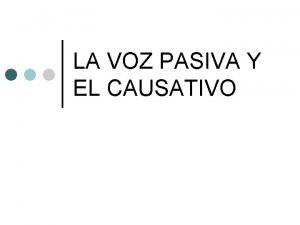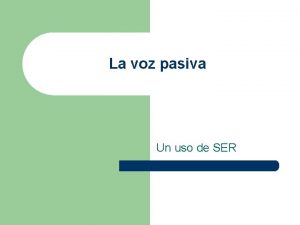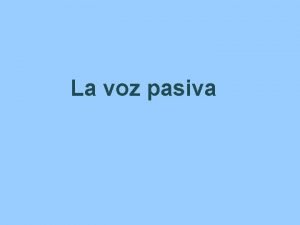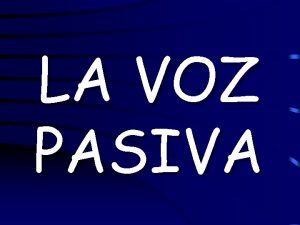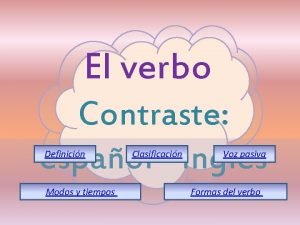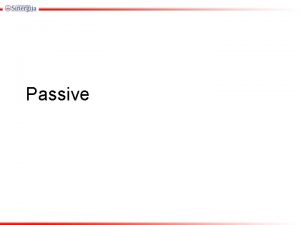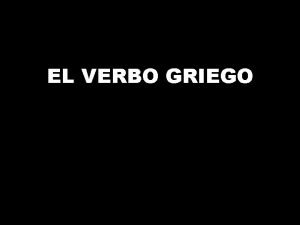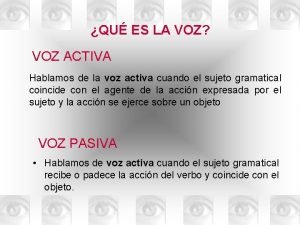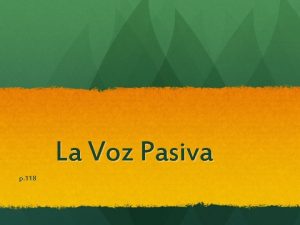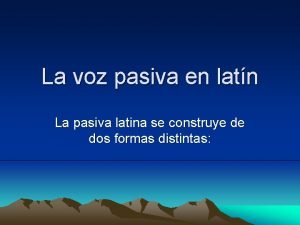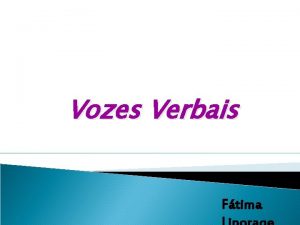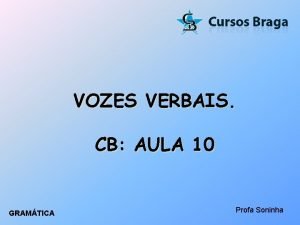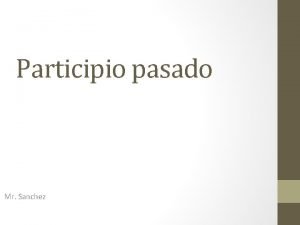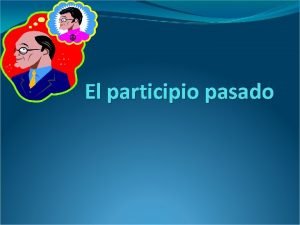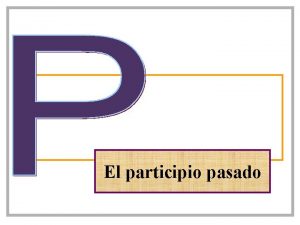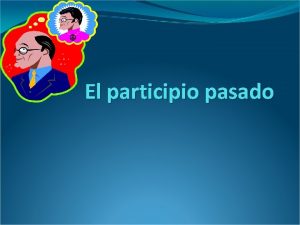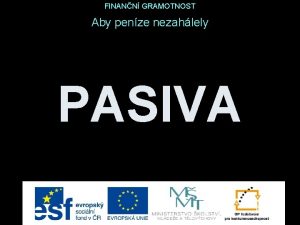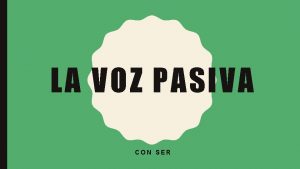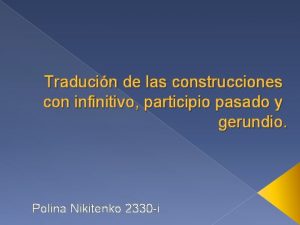LA VOZ PASIVA SER CON PARTICIPIO PASADO Y




















- Slides: 20

LA VOZ PASIVA “SER” CON PARTICIPIO PASADO Y “SE” CON 3 a. PERSONA PLURAL SINGULAR Y

PARTICIPIO PASADO (past participle SER + ADJETIVOS (descriipciones) PERFECTOS (perfect tense) Adjetivos de verbos (participio pasado) Haber + participio pasado Soy informado/a Eres educado/a He comido, habia comido, etc. Has preparado, habias preparado Adjetivos diferentes Soy fabuloso/a Somos Buenos/as Hemos dicho, habiamos dicho Han roto, habian roto ESTAR + ADJETIVOS (condiciones/emociones) VOZ PASIVA Ser + participio pasado Adjetivos de verbos (participio pasado) Estoy alterado/a Estamos controlados/as Adjetivos diferentes Estoy nervioso/a Estamos tristes El poema es/fue escrito La ciudad es/fue destruida Las casas son/ fueron construidas

TENSES CAN BE ACTIVE PASSIVE Present Simple Jane writes the letter The letter is written by Jane Present Progressive Jane is writing the letter The letter is being written by Jane Present Perfect Jane has written the letter The letter has been written by Jane

La voz activa vs. La voz pasiva Versión Activa El presidente convocó la reunión. La reunión fue convocada (por el presidente). Versión Pasiva

La formula de la voz pasiva SER Presente: es, son Pretérito: fue, fueron Imperfecto: era, eran Futuro: será, serán + PARTICIPIO PASADO Regular AR ER - IR ado ido Irregulares (next page): hecho, dicho, etc

Participios irregulares: Abrir Cubrir Descubrir Escribir abierto cubierto descubierto escrito Prescribir prescrito Describir Hacer descrito hecho Decir Morir Poner Romper Volver dicho muerto puesto roto visto vuelto Envolver envuelto Devolver devuelto Ir ido Revolver revuelto

Participios que son diferentes como adjetivos: c. PARTICIPIOS PASADOS que son diferentes como adjetivos: VERBOS PARTICIPIOS PASADOS ADJETIVOS Bendecir Bendecido Bendito Freir Freído Frito Completar Completado Completo Limpiar Limpiado Limpio

PARA COMPRENDER LA FORMULA VOZ ACTIVA In the active voice, the action of the verb is done by the subject and the direct object receives the action. Reparo los coches. I repair the cars. Ella esta leyendo el libro. She is reading the book. VOZ PASIVA In the passive voice, the verb is done by the direct object and the subject receives the action. Los coches son reparados por mí. The cars are repaired by me. El libro esta siendo leido por ella. The book is being read by her. Todo el mundo le respeta a él. Everyone respects him. El es respetado por todo el mundo. Mis amigos quieren a mi madre. Mi madre es querida por mis amigos. My friends like my mother. He is respected by everyone. My mother is like by my friends.

Mas notas acerca de la Voz Pasiva Notes: The passive voice has two parts: the conjugated verb ser + the past participle. The agent (the person performing the action on something else) is introduced by the preposition por. The past participle has to agree with the subject, not the agent, in gender and number, just like adjectives.

La voz pasiva can occur in all tenses and moods by conjugating ser into that tense or mood: Voz Activa PRESENTE Yo hago la comida. PRETERITO Yo hice la comida. IMPERFECTO Yp hacia la comida FUTURO Yo hare la comida SUBJUNTIVO …que yo haga la comida Voz Pasiva PRESENTE La comida es hecha por mí. PRETERITO La comida fue hecha por mí. IMPERFECTO La comida era hecha por mí FUTURO La comida será hecha por mí SUBJUNTIVO. . . que la comida sea hecha por mí , ETC.

Cómo se construye la frase en pasiva?

Cómo se construye la frase en voz pasiva?

Para practicar la voz pasiva, haz este ejercicio: Modelo: Manco Capac fundó el imperio de los Incas. El imperio de los Incas fue fundado por Manco Capac. Los Incas conquistaron un territorio que abarca parte de Chile y Ecuador. __________________________________ Ellos construyeron la ciudad sagrada de Machu Picchu. __________________________________ Sacerdotes habitaban los palacios de la ciudad. __________________________________ Sus habitantes abandonaron Machu Picchu en la época de la conquista española. __________________________________ Las plantas invadieron el sitio. __________________________________ La vegetación tropical cubrió los edificios por varios siglos. __________________________________ En el Siglo XX el estadounidense Hiram Bingham descubre las ruinas. __________________________________ Y ahora turistas del mundo entero visitan este sitio arqueológico excepcional. __________________________________

¿Comprendes el Participio Pasado ? ¿Puedes darme un ejemplo de Participio Pasado referente a tu vida?

VOZ PASIVA CON “SE” IMPERSONAL It is formed with the pronoun se + verb in the 3 rd person (singular or plural). The subject is the direct object of the active voice sentence and the verb agrees with it. Used above all in signs and advertisements, when it is not important to mention the agent. Be careful not to confuse the reflexive passive voice with impersonal sentences. Impersonal sentences don’t have a subject.

VOZ PASIVA CON “SE” IMPERSONAL Apartment for sale. Se vende piso. English spoken. Se habla inglés. They rented a car Se renta un coche. Mexico celebrates Independence day on September 15 th. Se celebra la independencia el 15 de Septiembre.

EL VERBO “ESTAR” CON EL PARTICIPIO PASADO, REFERS TO THE RESULT OF AN ACTION. IT REFERS TO THE NOUN AND ITS CONDITION, MORE THAN TO THE ACTION.

Resultado Acción Yo he abierto la puerta Yo abrí la puerta Yo he abierto la puerta As a result of my action La puerta está abierta condición adjetivo

Resultado Acción Yo he preparado la limonada Yo preparé la limonada As a result of my action La limonada está preparada condición adjetivo

Acción Resultado Hemos roto el vaso Rompimos el vaso El vaso es roto por nosotros As a result of my action El vaso está roto condición adjetivo
 Voz activa
Voz activa Pasiva
Pasiva Voz activa y voz pasiva
Voz activa y voz pasiva Vos pasiva
Vos pasiva Vos pasiva
Vos pasiva Verbos de contraste
Verbos de contraste Laura construye una casa para sus muñecas en voz pasiva
Laura construye una casa para sus muñecas en voz pasiva 1. he opens the door
1. he opens the door Pasiva refleja ejemplos
Pasiva refleja ejemplos Verbo en griego
Verbo en griego Voz activa y pasiva
Voz activa y pasiva Voz pasiva
Voz pasiva Voz pasiva latin
Voz pasiva latin пассивный залог
пассивный залог Feliz h
Feliz h Voz passiva analítica
Voz passiva analítica Passe as frases para a voz passiva
Passe as frases para a voz passiva Maly voz velky voz
Maly voz velky voz Somos la voz de los que no tienen voz
Somos la voz de los que no tienen voz Jogo vozes verbais
Jogo vozes verbais O que é voz passiva
O que é voz passiva

